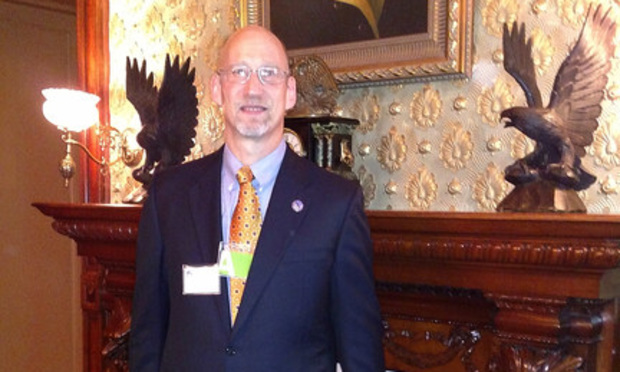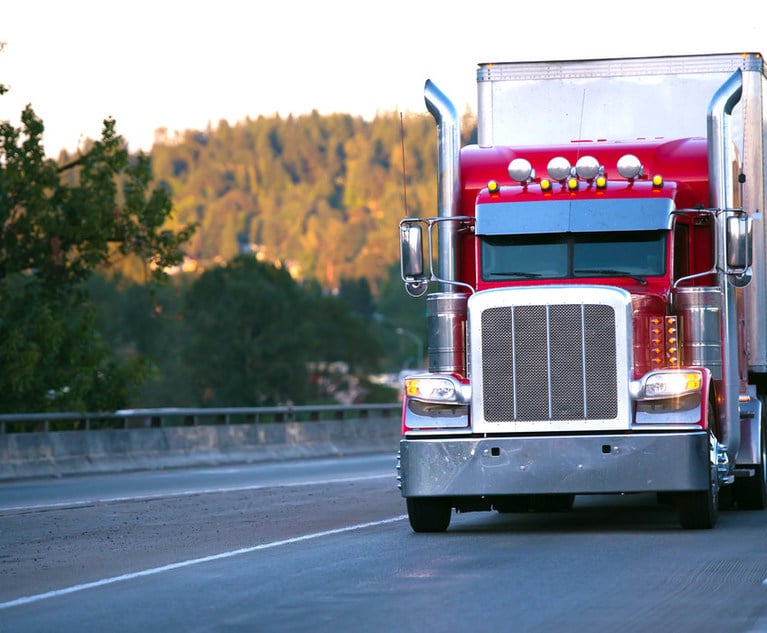Georgia GC Discusses White House Meeting With Trade Officials
Burl Finkelstein, executive vice president and general counsel at Kason Industries Inc. in Newnan, was among the attendees of the annual trade conference for the Coalition for a Prosperous America last month.
April 11, 2019 at 03:56 PM
6 minute read
The original version of this story was published on Corporate Counsel
 Burl Finkelstein, Kason Industries general counsel, standing inside the Eisenhower Executive Office Building next to the West Wing. Courtesy photo.
Burl Finkelstein, Kason Industries general counsel, standing inside the Eisenhower Executive Office Building next to the West Wing. Courtesy photo.
While trade tensions have left some companies feeling uneasy, especially those with a global footprint, others are applauding the Trump administration's “America First” stance. And a contingent of those supporters gathered at the White House last month during the Coalition for a Prosperous America annual trade conference.
The nonprofit organization's members were given access to several trade officials, including U.S. Trade Ambassador Robert Lighthizer and Peter Navarro, assistant to the president and director of the Office of Trade and Manufacturing Policy, along with a few lawmakers, including Sen. Marco Rubio.
One of the in-house leaders in attendance was Burl Finkelstein, executive vice president and general counsel at Kason Industries Inc. in Newnan, Georgia, which makes hardware for refrigeration and food service equipment.
Finkelstein spoke with Corporate Counsel Wednesday about his history with the coalition and his takeaways from the meeting. The conversation has been edited for clarity and length.
Corporate Counsel: What attracted you to the coalition?
Burl Finkelstein: I joined after I dropped out of NAM, the National Association of Manufacturers, because NAM somewhat refused to take a do-no-harm-to-domestic- manufacturers policy and trade position. The multinationals and globalist companies in NAM, which are the bigger companies there, wanted free trade and open borders and any advantage they can get. And the domestic manufacturers were going out of business. They were losing their customers. The globalist companies can game the system however it's set up, they can take advantage of it. And, typically, domestic producing companies can't take advantage of it. All they do is end up losing their market because they can't play in both directions very well.
CC: Which industries were represented at the meeting?
BF: CPA is a unique group because it's such a cross section of odd bedfellows. CPA represents domestic manufacturing, farmers and ranchers and it also represents organized labor, the AFL-CIO [American Federation of Labor and Congress of Industrial Organizations] and Teamsters have representatives in CPA. They're people who typically I wouldn't want to keep even at arm's length. But everybody has an interest in keeping jobs in America and benefiting American workers and keeping American industry productive and competitive.
CC: What were the highlights of the group's talks with Peter Navarro and Bob Lighthizer?
BF: They talked about Section 232 tariffs [on steel and aluminum], protecting the country for national security reasons, and about how the tariffs on steel and aluminum were working, actually. We talked about if the 232 tariffs should be expanded to other areas that are somewhat strategic to our economy and national security. We also talked about the USMCA [United States-Mexico-Canada Agreement] and, for the most part, we supported what was on the table presently.
With Navarro, we talked about the Reciprocal Trade Act, to try to get a bill through Congress that he's promoting, and we supported it, to review how trade is working with specific countries and then add tariffs where trade is getting out of balance. And if we didn't achieve balance in trade, we'd have mechanisms in place to take measures to achieve the balance. We're big supporters of that.
CC: What did they say about expanding 232 tariffs?
BF: If it was necessary to do it on specific things, electronics and things like that that were necessary for national security—the chips that went in cameras and things like that that the Chinese ended up having a back door into—those issues for national security should be addressed, possibly through tariffs.
CC: Was there talk about ratcheting up tariffs on China?
BF: That was one of the discussions, but since that's under negotiation now on a number of different fronts, we didn't really talk specifics about what's coming and not coming. But we talked a lot about the negotiations with China, which are still on despite what the media is talking about. China typically has been the biggest culprit in cheating on trade practice with the U.S.
CC: What did Rubio have to say?
BF: [Rubio] was inspiring to us, because a year ago he was an ardent free trader. And he gave a speech talking about how important it is for the U.S. to have production here, to make jobs here, to keep our economy up, to give people a step into the middle class by having those jobs. He gave a thoroughly encouraging and optimistic speech.
CC: Any revelations or surprises during the meeting?
BF: I was favorably impressed that the CPA group had so much access and credibility with the White House and with the people at the top of trade policy now. We started out really as a grassroots group. Now, the CEO, Michael Stumo, he can pick up the phone and talk to Dr. Navarro. Dan DiMicco, our chairman, was part of the transition team giving advice to the Trump cabinet on trade. [The meeting] reinvigorated me. I've been going to Washington, D.C., now for at least 15 years. And basically each time I go there to meet with our representatives and others, we're going there to beg them not to take further actions that are going to cause us to lose our livelihood, and some agree with us and some don't, but it's usually going back every year and saying I've managed to keep this business another year and please don't do anything that promotes offshoring, that takes our business away.
Read More:
Uncertain Future of NAFTA Revamp Has Some Companies 'Waiting and Hoping'
Initial Response to NAFTA 2.0 From US Companies Appears Largely Positive
In-House Leaders Can Find Opportunity in Chaotic Trade Landscape
This content has been archived. It is available through our partners, LexisNexis® and Bloomberg Law.
To view this content, please continue to their sites.
Not a Lexis Subscriber?
Subscribe Now
Not a Bloomberg Law Subscriber?
Subscribe Now
NOT FOR REPRINT
© 2025 ALM Global, LLC, All Rights Reserved. Request academic re-use from www.copyright.com. All other uses, submit a request to [email protected]. For more information visit Asset & Logo Licensing.
You Might Like
View All
Federal Court Rejects Plaintiff's Attempt to Amend Claims Against Weapons Manufacturer

State Jury Awards $160M Verdict for Truck's Defective Design That Left Man With Spinal Cord Injury

Mercedes-Benz Hit With Consumer Class Action for Claims of Defective Wheel Configurations

Child Labor Probe Hammers Tennessee Factory, Highlighting Risks to Employers From Feds' Stepped-Up Enforcement
6 minute readTrending Stories
Who Got The Work
J. Brugh Lower of Gibbons has entered an appearance for industrial equipment supplier Devco Corporation in a pending trademark infringement lawsuit. The suit, accusing the defendant of selling knock-off Graco products, was filed Dec. 18 in New Jersey District Court by Rivkin Radler on behalf of Graco Inc. and Graco Minnesota. The case, assigned to U.S. District Judge Zahid N. Quraishi, is 3:24-cv-11294, Graco Inc. et al v. Devco Corporation.
Who Got The Work
Rebecca Maller-Stein and Kent A. Yalowitz of Arnold & Porter Kaye Scholer have entered their appearances for Hanaco Venture Capital and its executives, Lior Prosor and David Frankel, in a pending securities lawsuit. The action, filed on Dec. 24 in New York Southern District Court by Zell, Aron & Co. on behalf of Goldeneye Advisors, accuses the defendants of negligently and fraudulently managing the plaintiff's $1 million investment. The case, assigned to U.S. District Judge Vernon S. Broderick, is 1:24-cv-09918, Goldeneye Advisors, LLC v. Hanaco Venture Capital, Ltd. et al.
Who Got The Work
Attorneys from A&O Shearman has stepped in as defense counsel for Toronto-Dominion Bank and other defendants in a pending securities class action. The suit, filed Dec. 11 in New York Southern District Court by Bleichmar Fonti & Auld, accuses the defendants of concealing the bank's 'pervasive' deficiencies in regards to its compliance with the Bank Secrecy Act and the quality of its anti-money laundering controls. The case, assigned to U.S. District Judge Arun Subramanian, is 1:24-cv-09445, Gonzalez v. The Toronto-Dominion Bank et al.
Who Got The Work
Crown Castle International, a Pennsylvania company providing shared communications infrastructure, has turned to Luke D. Wolf of Gordon Rees Scully Mansukhani to fend off a pending breach-of-contract lawsuit. The court action, filed Nov. 25 in Michigan Eastern District Court by Hooper Hathaway PC on behalf of The Town Residences LLC, accuses Crown Castle of failing to transfer approximately $30,000 in utility payments from T-Mobile in breach of a roof-top lease and assignment agreement. The case, assigned to U.S. District Judge Susan K. Declercq, is 2:24-cv-13131, The Town Residences LLC v. T-Mobile US, Inc. et al.
Who Got The Work
Wilfred P. Coronato and Daniel M. Schwartz of McCarter & English have stepped in as defense counsel to Electrolux Home Products Inc. in a pending product liability lawsuit. The court action, filed Nov. 26 in New York Eastern District Court by Poulos Lopiccolo PC and Nagel Rice LLP on behalf of David Stern, alleges that the defendant's refrigerators’ drawers and shelving repeatedly break and fall apart within months after purchase. The case, assigned to U.S. District Judge Joan M. Azrack, is 2:24-cv-08204, Stern v. Electrolux Home Products, Inc.
Featured Firms
Law Offices of Gary Martin Hays & Associates, P.C.
(470) 294-1674
Law Offices of Mark E. Salomone
(857) 444-6468
Smith & Hassler
(713) 739-1250






